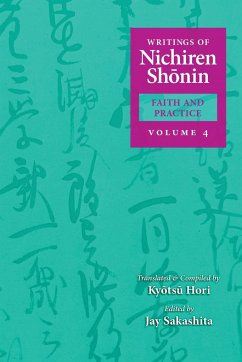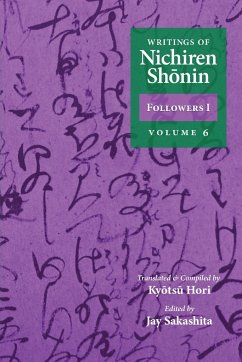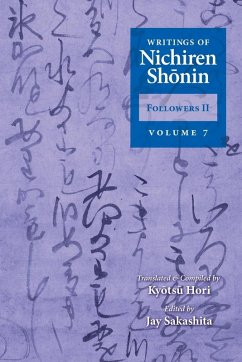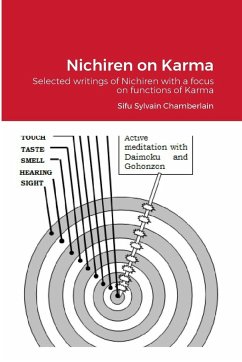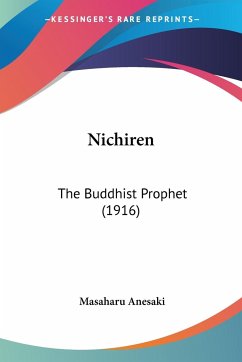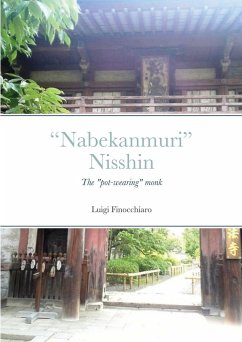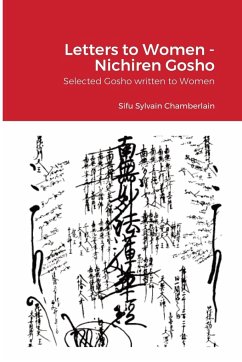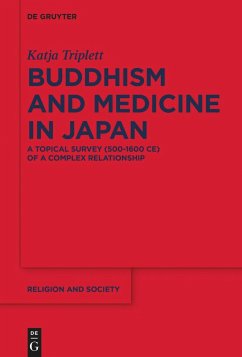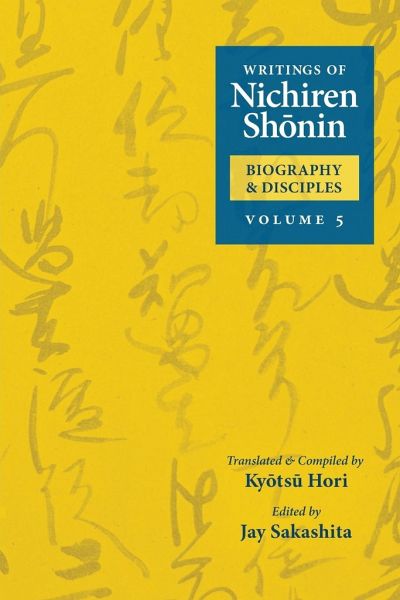
Writings of Nichiren Shonin Biography and Disciples
Volume 5
Herausgeber: Sakashita, Jay; Warner, Shinkyo
Versandkostenfrei!
Versandfertig in 1-2 Wochen
32,99 €
inkl. MwSt.

PAYBACK Punkte
16 °P sammeln!
This volume, the 13th project of the English Translation Committee of the Nichiren Shu Overseas Propagation Promotion Association (NOPPA), constitutes all 54 writings of Buddhist reformer Nichiren Sh¿nin (1222-1282) included in the Nichiren Shonin Zenshu, Complete Writings of Nichiren Shonin, Volume 5: Biography and Disciples, published in Tokyo in 1993. The Nichiren Shonin Zenshu is a modern Japanese version of Nichiren's original writings, translated and edited with annotations by modern scholars of Nichiren Buddhism. Despite its all-inclusive title, the Zenshu is highly selective in that i...
This volume, the 13th project of the English Translation Committee of the Nichiren Shu Overseas Propagation Promotion Association (NOPPA), constitutes all 54 writings of Buddhist reformer Nichiren Sh¿nin (1222-1282) included in the Nichiren Shonin Zenshu, Complete Writings of Nichiren Shonin, Volume 5: Biography and Disciples, published in Tokyo in 1993. The Nichiren Shonin Zenshu is a modern Japanese version of Nichiren's original writings, translated and edited with annotations by modern scholars of Nichiren Buddhism. Despite its all-inclusive title, the Zenshu is highly selective in that it takes into account only writings considered bibliographically authentic: attested to by original manuscripts. Among such texts, those included in the Showa Teihon Nichiren Shonin Ibun, Writings of Nichiren Shonin Standardized in the Showa Period, complied by the Rissho Daigaku Nichiren Kyogaku Kenkyu-jo, Center for the Study of Nichiren Buddhism, published by Minobusan Kuonji Temple between 1951 and 1959, are considered the most authoritative, and they provide the basic texts for this volume. This volume includes the Shimoyama Letter in which Nichiren helps his disciple Nichiei explain to Nichiei's father why Nichiei will not vow to abandon the Lotus Sutra and devote himself exclusively to the Pure Land Sutras. It is another example of how Nichiren shows his followers the benefits of practicing the Lotus Sutra, and the importance of criticizing those to slander the Lotus Sutra, especially if they are parents, employers, or officials who threaten to make their lives difficult. The volume is entitled "Biography and Disciples," since it contains over 16 writings in which Nichiren covers details of his life from his days as a novice priest at Seichoji Temple, through his propagation and persecution in Kamakura, his exiles to Izu and Sado, his attempts to warn the Japanese government of foreign invasion, the joys and hardships of his life at Mt. Minobu, and the decline of his health towards the end of his life. In most of his writings, we see Nichiren as a scholar who precisely dismantles the arguments of other schools of Buddhism. In other writings, such as Sovereigns of our Native Land, we see Nichiren as a politically astute historian. But in these writings, such as the Mt. Minobu Letter (ST 432), we see both Nichiren's skill as a poet, and his appreciation of other poets: In the rapids of the swift mountain streams I rinse vegetables, and as I wait impatiently for my dampened sleeves to dry I think of the old poet Hitomaro who recited, At Waka-no-ura, The fishermen think of the passing of their lives As they wait for the seaweed to dry.



